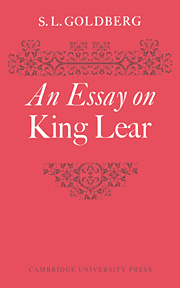6 - Speaking what we can
Published online by Cambridge University Press: 22 August 2009
Summary
In pondering this last scene of the play, nobody can afford to feel very confident of what he sees in it all, much less of putting words to it; but one or two things, even though largely negative ones, are perhaps obvious enough.
In the first place, there is an important distinction between the effect of Cordelia's death on Lear himself and its effect on us. For him it is literally unbearable; for us, although we may well find it almost so, it is not quite unbearable. For Lear Cordelia is ‘thou’, and her death a fact he has to answer to with his life if he can; for us she is also ‘she’, and her death a fact to which in the end we have to answer only with our consciousness. The difficulty for him is not the same difficulty as for us, though the two are intimately related and even overlap. We cannot but identify with him, but we are not confronting the mystery of life and death directly as he is. We are, it is true, looking at it through his eyes, but we are also looking at him. He is at least as much part of what we see as is Cordelia's death; and while the action impels us, along with him, to seek some intimation of ‘justice’ in the world, it also enables us to stand aside sufficiently to see his need of it as itself part of the world of which we seek it.
- Type
- Chapter
- Information
- An Essay on King Lear , pp. 155 - 192Publisher: Cambridge University PressPrint publication year: 1974



